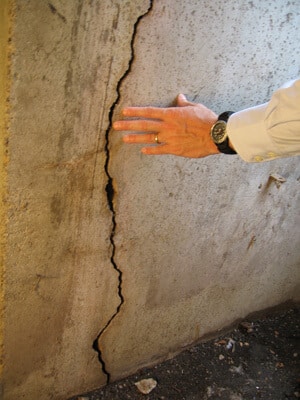When is My Home Just Settling and When Do I Need a House Foundation Repair?
As a homeowner or someone looking to buy a new home, it’s important to know when your house is settling and when you need foundation repairs. The difference between minor repairs and major repairs can save you money and time.
Fortunately, there are warning signs to look out for such as doors and windows sticking, walls separating from floors or ceilings, cracked walls or uneven stairs. In this post, we’ll provide you with everything you need to know to identify if your home needs foundation repairs, so you won’t encounter any unexpected surprises in the future.
Common Home Foundation Settlement Issues
Constructing a new home is a thrilling experience, but it can turn into a nightmare if not handled with care. New homes are often plagued by foundation settlement issues, which are mostly attributed to weather, climate and soil. Local builders usually rely on their regional expertise to navigate the construction process, but this may not always be enough.

Inadequate consideration of soil and climate during the surveying stage can lead to significant problems for home buyers in the future. It is essential for home buyers to ensure their builders possess the necessary knowledge and experience to account for all the factors when building their dream homes.
Foundation Settlement in Our Home State – Georgia
Georgia is a pretty wet state in general, averaging nearly 50 inches of rainfall a year, which is about 11 more inches than the national average. Let’s say, for example, that there were two exceptionally wet years of 55 inches each, followed by a drought year of 35 inches.
If the home was built during the wet years, then it was built on very saturated soils and clays. During the following dry year, that expanded, swollen soil and clay will retract as it dries out, which results in greater than normal settlement of the home.
If the builder took these changes into account and adjusted the soil below the home accordingly then your foundation should be fine. If they didn’t, you may run into foundation problems within five years of your home being built.
The Difference Between Normal Settling and Serious Foundation Issues
As a homeowner, it can be concerning to notice cracks in your foundation. However, it’s important to know not all cracks are a cause for alarm. In fact, some cracks can be expected in foundations. Nevertheless, it’s crucial to remain attentive and observe for other indicators that may suggest a more severe problem. Keep an eye out for things like doors and windows that are no longer closing properly, floors that appear uneven and visible cracks both inside and outside your home.
Although any one of these issues may not necessarily indicate a significant concern, when combined, they could be a sign of a foundation issue that requires immediate attention. Don’t wait until it’s too late to act- make it a priority to watch for warning signs and take action accordingly.
Cracks in Walls and Foundation
It’s unfortunate that even small cracks in walls or flooring can indicate bigger problems. Specifically, if you see jagged cracks running at approximately a 45-degree angle, it’s a major concern. These types of cracks may suggest that there is a significant failure in the foundation, which can cause various problems such as a sinking or shifting home.
It’s essential to have a professional inspector examine any cracks in your walls or foundation to evaluate the situation before it becomes a more extensive and more expensive issue. Don’t wait until it’s too late to address these problems and ensure the safety and security of your home and loved ones.
Poorly Closing Doors and Windows
If you have doors and windows you struggle to close or seal despite the fact they’re new or properly lubricated it may be a sign that your foundation is shifting. Window and door openings should be perfectly squared off, so if they closed properly at one time but no longer do, that may mean shifts in your foundation have knocked things off-kilter enough that they no longer fit as they should.
Don’t Neglect Upper Stories
People often assume they should look at the foundation itself or floors to see if things are shifting, but oftentimes the most obvious changes are in the upper parts of your home. Inspect the interior and exterior of your upper floors for cracks, especially above window frames. Brick-constructed homes will often show stair-like cracks along the mortar.
Foundation Cracks
If soil moisture is the culprit of your foundation issues you may see horizontal cracks along your home’s foundation. These may be a sign of hydrostatic pressure, or excess water pressure affecting the foundation.
Contact A Foundation Repair Expert to Check On Any Problems
If you’re a homeowner and you’re noticing signs of potential foundation problems, it can be concerning. Are your doors and windows becoming harder to open or close? Is your floor sloping unevenly? Don’t wait for the problem to worsen. Reach out to Atlas Piers of Atlanta, the trusted experts in foundation repair.
With years of experience, their team understands the unique challenges that Georgia’s soil can pose to a home’s foundation. They’ll meticulously inspect your foundation, identify any problems and provide a tailored solution specific to your situation. With their expert assistance and detailed plan of action, you can be sure your home is safe and sound for years to come. Don’t hesitate, contact them today!





